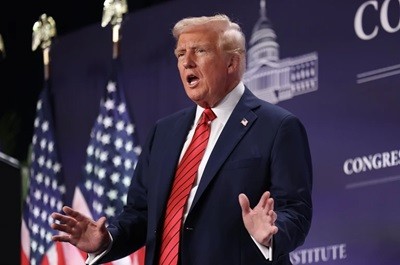When asked in 1787 whether the fledgling United States would be a monarchy or a republic, founding father Benjamin Franklin replied, “a republic, if you can keep it”. Today, the republic is composed of US federal agencies filled with scientists tasked with advancing the nation’s health, safety, security and competitiveness — through forecasting storms, preventing the spread of food-borne illnesses and making roads safer.
Until last month, when Donald Trump became US president, I was one of those scientists. I know what it means to take the oath of federal service and to take pride in being a public servant. And I know that there are several steps that the scientific community — both inside and outside the US government — should be prepared to take in the light of the second Trump presidency.
Trump will weaken climate action — the rest of the US must not follow suit
I’ve spent much of my career tracking the use and misuse of science in policy decisions. In 2021, I was called up to the US Office of Science and Technology Policy, and in 2023, I became the climate-change research and technology director at the US Department of Transportation. The passing of the Bipartisan Infrastructure Law (2021), the Inflation Reduction Act (2022) and the CHIPS and Science Act (2022) represented an opportunity for the nation to meet its greatest challenges, from clean energy to industrial innovation and artificial intelligence. I wanted to be a part of it.
I wasn’t alone. Hundreds of technical specialists also said yes to government work, driving our nation’s responses to climate change, societal inequities and more. In the past few years, the United States has made remarkable progress, investing billions of dollars in projects across all the states.
Now, the Trump administration has moved to undo that progress. Week-one executive orders have led to the furlough and firing of government staff who work in environmental justice and equity. Many people in these jobs will watch their hard-won work get dismantled before their eyes. An unlucky few will be tasked with dismantling it themselves. Others might choose to leave federal service.
Chaos erupts in US science as Trump’s team declares freeze on federal grants
But despair is not an option. It is important to remember that notable gains have been made in federal scientific-integrity protections in the past two decades. And, as recent years attest, many researchers are willing and able to engage in policy conversations through advocacy, public commentary and demonstrations (A. D. Ross et al. Sci. Commun. 40, 228–245; 2018).
The Union of Concerned Scientists and others have developed policies to strengthen scientific integrity, which have since been implemented by federal agencies and Congress. More than 20 agencies have executed or bolstered their scientific-integrity policies and hired specialists, covering hundreds of thousands of people across the federal workforce.
As a result, federal scientists now have more rights and protection from political interference than ever. For example, many can speak to the media about their science without approval from their supervisors, and can publicly note a differing scientific opinion for their work. Procedures for adjudicating allegations are being implemented.
These protections provide a solid foundation for the defence of science. Combined with a more scientific-integrity-savvy workforce, these put federal scientists on higher ground than was the case under earlier administrations.




